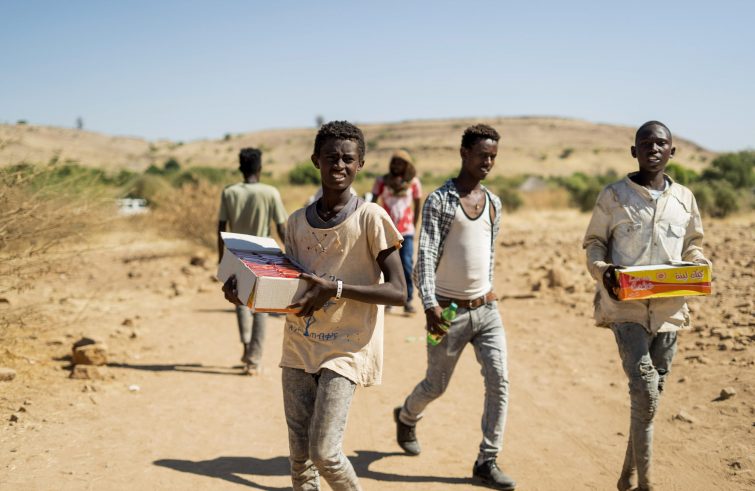
“I follow with apprehension the situation that has arisen with the conflict in the Tigray region of Ethiopia, knowing that its scope also embraces neighbouring Eritrea. Beyond religious and confessional differences, we realise how essential the message of ‘Brothers all’ is, when differences between ethnic groups and the consequent struggles for power are erected as a system”, the Pope said on 24 June speaking to the participants in the reunion of Aid Agencies for the Oriental Churches (ROACO), recalling the deadly consequences of the civil war in Tigray, a northern region of Ethiopia, between Ethiopian federal troops and Tigray People’s Liberation Front (TPLF), which broke out in November 2020.
Mass murder, rape and ethnic cleansing. During that period, the government in Addis Ababa, headed by Premier Abiy Ahmed Ali, had sent troops into the region of Tigray which is governed by the Tigray People’s Liberation Front (TPLF). Abiy, 2019 Nobel Peace Prize laureate, had claimed that the military operation was a response to attacks by Tigrayan forces on federal army facilities in the region. TPLF refuted the contention saying that the federal government and neighbouring Eritrea had launched a “coordinated attack” against Tigray. Since then, hostilities have left thousands of people dead, including at least 12 aid workers – the last three from Médecins Sans Frontières ( MSF) killed at the end of June – 2 million people displaced and reports of violence, gang rape and mass murders of civilians. On June 28, TPLF forces regained control of the capital Macallè while government troops withdrew from the region after a unilateral ceasefire declared by the authorities in Addis Ababa. Abiy clarified that the federal army withdrew from Macallé because it had attained its objectives. This claim was dismissed by the Tigrines, who claimed a “military victory.” Refugees and international observers reported episodes of atrocities by Ethiopian forces, including ethnic cleansing, looting and destruction. It is yet uncertain whether the withdrawal of the Ethiopian forces, together with their Eritrean allies, is limited to Macallé or whether it includes the entire region. There are reports of the presence of Eritrean troops still engaged in armed conflict. Humanitarian workers throughout the region are also reporting the presence of Eritrean soldiers.
Risk of starvation. UNICEF estimates that a minimum of 56,000 children in Tigray will require treatment for severe malnutrition in 2021. Among these, 33 000 will not receive treatment unless unrestricted access is guaranteed. The UN Food and Agriculture Organisation (FAO) and the World Food Programme (WFP) have also raised concerns over the impending famine in Tigray. More than 350,000 people in the Tigray region are already facing disastrous conditions, according to the Integrated Food Security Phase Classification (IPC), a worldwide initiative involving 15 UN agencies, regional organisations and international NGOs. Over 60% of the population, amounting to over 5.5 million people, are facing acute food insecurity. Of these, 2 million people are experiencing so-called ’emergency’ levels of acute food insecurity and, in the absence of urgent intervention, could rapidly precipitate into starvation.
Where are the so-called civilised countries? Local sources, who for security reasons asked to remain anonymous, interviewed by SIR, confirmed that “Eritreans have not withdrawn completely. They disguise as civilians and cause difficulties. When discovered they are killed. It’s like a horror movie.” The sources also denounced “the stationing of Ethiopian federal troops on each road and passageway into Tigray. The withdrawal announced by Prime Minister Abiy,” they say, “is a tactical move to send a signal of his goodwill to the world and force the TPLF to pull out from its known battlefield, where it is invincible. Simultaneously with the withdrawal, Ethiopian troops ‘are bombing bridges and strategic sites and they are blockading all essential life-saving supplies, including electricity and water as well as humanitarian aid. Access to all fuels, such as petrol, diesel and kerosene, is also denied.” The threat of international sanctions is not enough to restrain the governments in Addis Ababa and Asmara, “with the support of China, Russia and Turkey, which also supply them with weapons”, the sources reported, denouncing an ongoing “massacre.” “Six million Tigrayans are being killed here every day by weapons, hunger, thirst, rape and ignorance. Schools have remained closed for two years.”
“Where are the so-called civilised countries? Why are they not speaking out?”
“Can politics and diplomacy have the upper hand over the lives of millions of innocent people? Dying is a better option than being part of this inhuman system,” the sources bluntly stated. “Is there anyone who has the courage to report the facts before it is too late?” The most dramatic aspect:
“When the shooting stops, there is a haunting, surreal silence. Not a dog barking, a bird whistling, no sound of human activity or presence. Weeping children is all that is heard. Their sobbing is the only sound that breaks this deafening silence. Amidst the absence of the international community…”.












